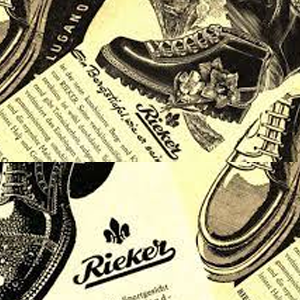- Mens Mens FootwearPopular SizesUKPopular BrandsShop By Range
- Womens Womens FootwearPopular SizesUKPopular BrandsShop By Range
- Kids Kids FootwearPopular SizesUKPopular Brands
- Bags & Accessories
- Brands
Toggle Nav 
View Our Range


The History Of Rieker
Rieker’s history dates back to the earlier part of the 19th Century. Rieker was established in the black forest district of Tuttlingen, Southern Germany. At conception, the company produced shoes for the wealthy populace of Northern Italy.
Tuttlingen was where Heinrich Rieker and his business associate Carl Seltz started the concept of making footwear for affluent patrons. In 1901, Carl Seltz choose to leave the brand.
Due to the diligence of Rieker and his co-workers, the brand was soon known for high-quality and innovative designs that can be worn daily and became well-patronized in Central Europe. Its reputation for mens shoes became famous in the fashion world. As their patrons journeyed, they informed others about the little company that was making some of the most adorable footwears anyone would find. This made Rieker shoes for men well-known in Italy. Due to the fame, it garnered within its environment and the emerging market among the very wealthy families, it took only a little while before Rieker boots, as well as Rieker shoes, drew more attention around the globe.
Even though they started with a few simple designs that were seen as elegant as they were functional, request for the shoes among the wealthy citizens led to the production of more designs. Apart from Rieker boots and Rieker shoes for men, it was just a little time before the company would introduce Rieker shoes for women. Currently, Rieker sells shoes and other items to more than 9000 retailers, especially in Europe. The company is a family-run business of 5 generations that commits itself to offer style and quality that has undergone improvements for over thirty years. The brand employs about 20,000 employees mainly in Romania, Tunisia, Slovakia, Morocco, and Vietnam where its production facilities are sited. Immediately after Rieker commemorated its quarter-century of being in the business, developments began to set in.
The expansion of the company was deliberate and planned, instead of being directed by the motivation to realize sharp gains in an emerging market. The workers who were making Rieker shoes for men would later produce Rieker shoes for women became motivated by the incredible welfare packages and incentives allotted to them. Unlike their competitors who overworked themselves and later closed stores, Rieker boots and shoes kept on manufacturing at a consistent pace. This contributed tremendously to the financial successes that was achieved when compared to other shoe manufacturing companies in the fashion world.
As the request for Rieker shoes for men continued to grow and the possibility of later exploiting a new market with the production of Rieker shoes for women, the founder and the operation team were always on the look out to improve the production process. At every stage of production, the Rieker shoe brand is dedicated to maintaining an uncompromising standard and control over the materials used in its products, which is in correlation with the vision and mission of its founders.
View Our Range

